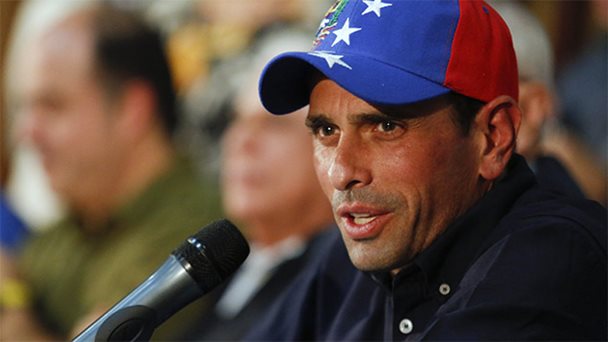Opposition’s Capriles Wants ‘Padlock’ Law to Halt International Oil Treaties
Twice presidential candidate for the Venezuelan opposition Henrique Capriles Radonski has revealed that he has proposed a “padlock” law to the incoming opposition parliamentary bloc in the National Assembly. The legislation would prevent the government from negotiating further international oil treaties with other countries.

Caracas, December 17th 2015 (venezuelanalysis.com) – Venezuelan opposition politician Henrique Capriles Radonski has confirmed to press that he has proposed a “padlock law” to the incoming majority opposition parliamentary bloc in the country’s National Assembly.
According statements made by the two-time opposition presidential candidate, the law would “put an end to oil diplomacy” and “stop the government from giving away and wasting the country’s resources”.
“The government uses oil to buy loyalties in its favour, not for the benefit of Venezuelans. The ‘padlock law’ would prevent international agreements to the detriment of the country,” stated Capriles from a press conference in Guarenas just outside the capital Caracas.
The comments appear to be directed at the government’s “PetroCaribe” initiative- which since 2005 has provided neighbouring Caribbean countries with much needed oil at significantly preferential repayment rates.
The Venezuela-Cuba project known as the Bolivarian Alliance for the People of Our Americas (ALBA) is another likely focus of Capriles’ latest comments.
The ALBA promotes direct-non monetary and fair trade relations between its 11 member states, including the exchange of Venezuelan oil for medical personnel training by Cuban doctors.
Both initiatives are credited with having played a vital role in shielding smaller economies such as Haiti from the volatility of the global energy market and aiding Latin American development.
But the Venezuelan opposition has long argued that the treaties are a drain on national resources. The MUD’s political programme has consistently been in favour of a return to pre-Chavez (1999) oil policy- including opening the now nationalised industry to mass private investment.
On December 6th, the MUD won 112 seats and a “super-majority” in the country’s legislative elections. The victory could allow the parliamentary bloc to repeal international treaties such as the ALBA.
“The dollars that are being given away to other nations for convenient political reasons should be going towards buying food and medicine for the people in this difficult situation that we Venezuelans are living through,” added Capriles.
The new parliament will be sworn in this coming January 5th.
